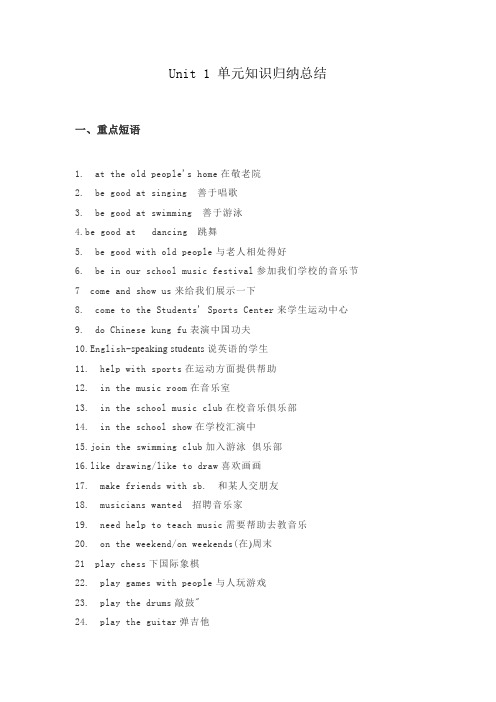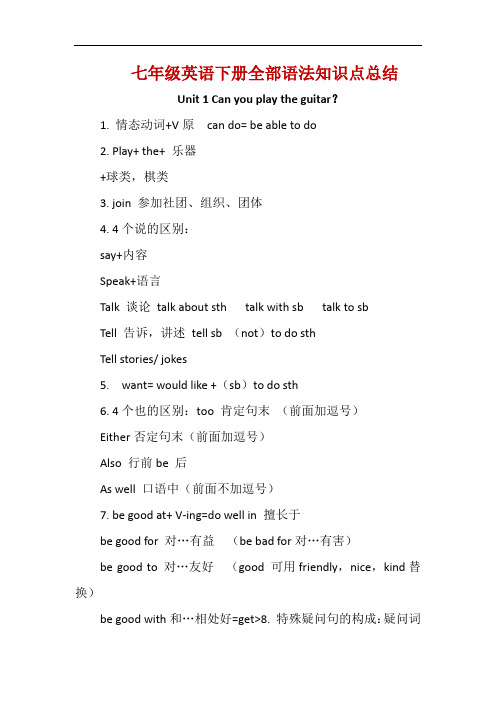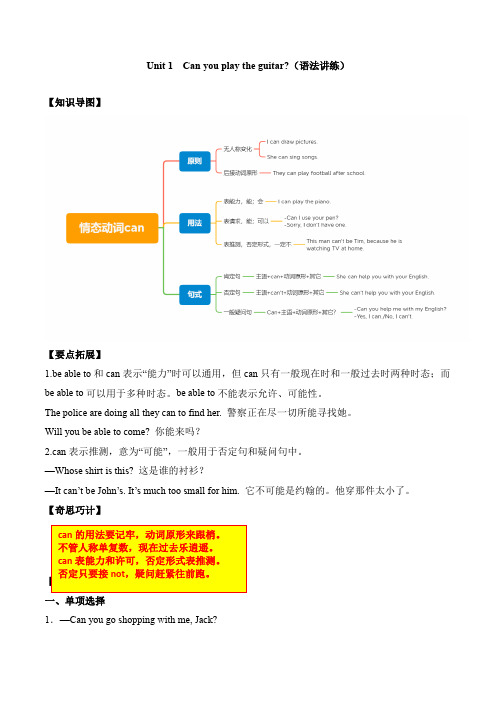七年级下册unit1语法知识点总结
译林版英语七年级(初一)下单元知识点及语法归纳

七年级英语下册知识点总结Unit 1 Dream homes一、重点词组、句型1、Would you like to live in the palace, Eddie? 埃迪,你想住宫殿里吗?①Would you like sth? 肯定回答:Yes, please. 否定回答:No, thanks.②Would you like to do sth? 肯定回答:Yes, I’d like/love to. 否定回答:I’d like/love to, but…2、There are twenty restaurants in town. 镇上有二十家餐馆。
There are about 8,000,000 people living in London. 大约有八百万人住在伦敦。
①表示某地有……,用there be 句型,谓语动词就近原则。
There __________(be) an art room, a music room and two computer rooms in our school.②表示有事情要做,用there be sth to do。
There are lots of things ___________(see) in Beijing..③表示有某人正在做某事,用there be sb doing sth.。
On game shows, there are always famous people___________(talk) about their lives.3、I live in a town 15 miles from London. 我住在离伦敦15英里的一个镇上。
be far (away) from 离……远,但出现具体距离时,不用farMy home is __________________from the school.My home is 5 kilometres ___________from the school. A. away B. far C. close D. next to 4. have fun with sb./sth. 和某人/某物玩得开心have fun doing sth. 做某事很开心have(has/had) fun= have(has/had) a good time= enjoy(enjoyed) onself(myself/yourself/youselves……)5、I also have a bedroom of my own. =I also have my own bedroom. 我也有自己的房间。
人教七年级英语下册 Unit 1 单元知识归纳总结

Unit 1 单元知识归纳总结一、重点短语1. at the old people's home在敬老院2. be good at singing 善于唱歌3. be good at swimming 善于游泳4.be good at dancing 跳舞5. be good with old people与老人相处得好6. be in our school music festival参加我们学校的音乐节7 come and show us来给我们展示一下8. come to the Students' Sports Center来学生运动中心9. do Chinese kung fu表演中国功夫10.English-speaking students说英语的学生11. help with sports在运动方面提供帮助12. in the music room在音乐室13. in the school music club在校音乐俱乐部14. in the school show在学校汇演中15.join the swimming club加入游泳俱乐部16.like drawing/like to draw喜欢画画17. make friends with sb. 和某人交朋友18. musicians wanted 招聘音乐家19. need help to teach music需要帮助去教音乐20. on the weekend/on weekends(在)周末21 play chess下国际象棋22. play games with people与人玩游戏23. play the drums敲鼓"24. play the guitar弹吉他25. play the piano 弹钢琴26. play the violin 拉小提琴"27. students wanted for the school show为学校演出招募学生28. tell stories讲故事29. the story telling club讲故事俱乐部30. talk with sb. about sth. 和某人谈论某事二、重点句型1.—Can you play the guitar or the violin?你会弹吉他还是拉小提琴?—I can play the guitar.我会弹吉他。
人教版七年级下册英语Unit 1 知识点语法归纳总结

人教版七年级下册英语Unit 1 知识点语法归纳总结Unit 1 What’s the matter?1.短语归纳2.典句必背3.用法集萃(1)当别人心情不好,身体不适或遇到麻烦时,我们可以用如下表达表示关心:❖What’s the matter?❖What’s the matter with you?❖What’s wrong with …?❖What’s the trouble\problem with …?(2)英语中常用have描述身体的不适,此时have意为“患有”,常用结构:①have a + 疾病例:have a cold 感冒;have a fever 发烧;have a cough 咳嗽②have a + 身体部位-ache例:have a headache 头痛;have a toothache 牙痛③have a sore + 身体部位例:have a sore throat 咽喉痛;have a sore back 背痛(3)lie down躺下;tell lies/a lie 说谎(4)maybe & may be①maybe,“或许”,常用于句首,表示可能性,后加句子。
例:Maybe you are right.②may be,是情态动词+be的结构,意为“可能,也许”,后加名词、代词或形容词。
例:He may be angry.(5)sound like & sound①sound like+名词/代词/从句例:It sounds like you don’t know the truth. It sounds like a good idea.②sound+形容词,“听起来,好像”,例:The music sounds nice.(6)…when the driver saw an old man lying on the side of the road. ……这时司机看到意为老人躺在路边。
鲁教版(五四学制)七年级下册英语Unit 1 语法知识清单

鲁教版(五四学制)七年级下册英语Unit 1 语法知识清单Unit 1 Do you want to watch a game show? 知识清单词形转换Section Acation(n. )教育adj. educational 教育的;有教育意义的2.plan(u.&n.)打算;计划过去式planned 现在分词planning3.discussion(n. )讨论;商量n.discuss 讨论4.stand(v.)忍受;站立过去式stoodedy(n. )喜剧;喜剧片pl. ComediesSection B1.mean(v.)意思是_ n. meaning 意义;意思adj, meaningful 意味深长的,意义明显的反义词meaningless 毫无意义的;意思不明确的2. act(v.)行为;扮演_ n. action行动3. appear(v.)出现反义词disappear消失4. become(v.)开始变得;变成过去式became5. rich(adj.)富有的_反义词poor贫穷的6. success(n.)成功adj. successful获得成功的_ adu.successfully成功地7. film(n. )电影_ 同义词movie8. lucky(adj. )幸运的反义词unlucky不幸的;不吉利的adv. luckily 幸运地9. lose(v. )失去;丢失过去式lost10. simple(adj. )简单的;易做的同义词easy adv. simply 简单地11. army(n.)陆军;陆军部队pl. Armies12.famous 著名的,出名的;同义词well-known重要短语和知识点:Section A1.talk show访谈节目2.soap opera肥皂剧3.sports show体育节目4.game show游戏节目5.talent show才艺节目6.soccer game足球比赛7.don't mind不介意;无所谓mind (one’s) doing介意某人做某事Do you mind my/me calling you at night?8. can't stand (doing) sth. 不能忍受Jack can’t stand staying at home.9. think of认为10. watch the news看新闻11. find out查明;弄清look for “寻找”,强调找的动作和过程What are you looking for?find “找到,发现”,强调找的结果He found the cat at last.Can you find out what time the meeting starts?12.around the world全世界13. have a discussion about.. 进行一场关于....的讨论14. my favorite TV shows我最喜欢的电视节目15. expect (sb.) to do sth.期待(某人)做某事16. learn a lot from...从...中学到很多17. one day (有)一天18. hope to do sth. 希望做某事(主语希望自己)I hope to see you again.hope + that 从句I hope that he will come soon.19.plan to do sth.打算做某事;计划做某事make a plan for...为......制定计划We must make a plan for our holiday.20.want to do sth.想要做某事21. watch a sports show观看体育节目Section B1.action movie动作影片2.scary movie恐怖片。
人教版七年级下册英语Unit 1 知识点语法归纳总结

人教版七年级下册英语Unit 1 知识点语法归纳总结Unit 1 What’s the matter?1.短语归纳2.典句必背3.用法集萃(1)当别人心情不好,身体不适或遇到麻烦时,我们可以用如下表达表示关心:❖What’s the matter?❖What’s the matter with you?❖What’s wrong with …?❖What’s the trouble\problem with …?(2)英语中常用have描述身体的不适,此时have意为“患有”,常用结构:①have a + 疾病例:have a cold 感冒;have a fever 发烧;have a cough 咳嗽②have a + 身体部位-ache例:have a headache 头痛;have a toothache 牙痛③have a sore + 身体部位例:have a sore throat 咽喉痛;have a sore back 背痛(3)lie down躺下;tell lies/a lie 说谎(4)maybe & may be①maybe,“或许”,常用于句首,表示可能性,后加句子。
例:Maybe you are right.②may be,是情态动词+be的结构,意为“可能,也许”,后加名词、代词或形容词。
例:He may be angry.(5)sound like & sound①sound like+名词/代词/从句例:It sounds like you don’t know the truth. It sounds like a good idea.②sound+形容词,“听起来,好像”,例:The music sounds nice.(6)…when the driver saw an old man lying on the side of the road. ……这时司机看到意为老人躺在路边。
精编七年级英语下册全部语法知识点总结

七年级英语下册全部语法知识点总结Unit 1 Can you play the guitar?1. 情态动词+V原can do= be able to do2. Play+ the+ 乐器+球类,棋类3. join 参加社团、组织、团体4. 4个说的区别:say+内容Speak+语言Talk 谈论talk about sth talk with sb talk to sbTell 告诉,讲述tell sb (not)to do sthTell stories/ jokes5. want= would like +(sb)to do sth6. 4个也的区别:too 肯定句末(前面加逗号)Either否定句末(前面加逗号)Also 行前be 后As well 口语中(前面不加逗号)7. be good at+ V-ing=do well in 擅长于be good for 对…有益(be bad for对…有害)be good to 对…友好(good 可用friendly,nice,kind替换)be good with和…相处好=get>8. 特殊疑问句的构成:疑问词+一般疑问句9. How/ what about+V-ing …怎么样?(表建议)10. 感官动词(look, sound, taste, smell, feel)+adj/ like11. 选择疑问句:回答不能直接用Yes或者No,要从中选择一个回答12. students wanted for school show(wanted表示招募,含有被动意义)13. show sth to sb=show sb sthgive sth to sb=give sb sth14. help sb (to)do sthHelp sb with sthWith sb’s help= with the help of sbHelp>15. be busy doing sth/ be busy with sth16. need to do sth17. be free= have time18. have friends= make friends19. call sb at +电话号码20.on the weekend= on weekends21. English-speaking students 说英语的学生(带有连词符,有形容词性质)22. do kung fu表演功夫Unit 2 What time do you go to school?1. 问时间用what time或者whenAt+钟点at 7 o’clockat noon/ at night(during/ in the day)On+ 具体某天、星期、特指的一天on April 1st on Sunday on a cold winter morning In +年、月、上午、下午、晚上2. 时间读法:顺读法逆读法:分钟≤30用pastfive past eight(8:05)half past eight(8:30)分钟>30用to a quarter to ten(9:45)整点用…o’clock 7 o’clock(7:00)3. 3个穿的区别:wear 表状态,接服装、手套、眼镜、香水等Put>Dress 表动作,接sb/>4. from…to…5. be/ arrive late for6. 频度副词(行前be后)Always usually often sometimesseldom hardly never7. 一段时间前面要用介词forfor half an hour for five minutes8. eat/ have…for breakfast/ lunch/ dinner/ supper9. either…or10. a lot of=lots of11. it is +adj+for sb +to do sth (adj修饰to do sth)It is important for me to learn English.it is +adj+of sb +to do sth (adj修饰sb)It is kind/ friendly/ nice of you to help me.12. 感叹句:How+adj+主谓!How+adj+a/an +n单+主谓!What+ a/an +adj+ n单+主谓!What+ adj+ n复/ 不可数+主谓!Unit 3 How do you get to school?1. 疑问词How 如何(方式)how long 多长(时间)答语常用“(For/ about +)时间段”how far多远(距离)答语常用“(It’s +)数词+miles/ meters/ kilometers”how often多久一次(频率)答语常用“Always/ often/ every day/…”或“次数+时间”等表频率的状语How soon多快,多久以后,常用在将来时中。
七年级英语下册_Unit 1 语法思维导图及专练(解析版)

Unit 1 Can you play the guitar?(语法讲练)【知识导图】【要点拓展】1.be able to和can表示“能力”时可以通用,但can只有一般现在时和一般过去时两种时态;而be able to可以用于多种时态。
be able to不能表示允许、可能性。
The police are doing all they can to find her. 警察正在尽一切所能寻找她。
Will you be able to come? 你能来吗?2.can表示推测,意为“可能”,一般用于否定句和疑问句中。
—Whose shirt is this? 这是谁的衬衫?—It can’t be John’s. It’s much too small for him. 它不可能是约翰的。
他穿那件太小了。
【奇思巧计】一、单项选择1.—Can you go shopping with me, Jack?—Sorry, I ________. I have to play the piano first.A.can’t B.shouldn’t C.mustn’t【答案】A【详解】句意:——杰克,你能和我一起去购物吗?——对不起,我不能。
我得先弹钢琴。
考查情态动词和一般疑问句的回答。
can’t不能;shouldn’t不应该;mustn’t不许,禁止。
根据“Can you go shopping with me, Jack?”可知是can开头的一般疑问句,通常还是用can回答。
结合“ I have to play the piano first.”可知,此处是“对不起,我不能”。
故选A。
2.— Can you find Black Hill on the map, Cindy?— ________. It’s here!A.Yes, I must B.Yes, I can C.No, I needn’t D.No, I don’t【答案】B【详解】句意:——Cindy,你能在地图上找到黑山吗?——是的,我可以。
七年级下册英语unit1知识点归纳

七年级下册英语unit1知识点归纳七年级下册英语unit1主要涉及到人称代词、一般现在时、疑问句、数量词、情态动词的用法等知识点。
以下是对这些知识点的详细归纳:一、人称代词人称代词是英语中一个非常基础的语法概念,掌握好人称代词的用法对于学好英语至关重要。
在七年级下册英语unit1中,我们主要学习了三类人称代词,分别是主格人称代词、宾格人称代词和物主代词。
主格人称代词包括:I、you、he、she、it、we、they我们可以用主格人称代词来代替主语,比如:I am a student. -> I is a student.She likes apples. -> She likes them.宾格人称代词包括:me、you、him、her、it、us、them 我们可以用宾格人称代词来代替宾语,比如:Tom called me. -> Tom called him.I saw her yesterday. -> I saw him yesterday.物之代词包括:mine、yours、his、hers、its、ours、theirs 我们可以用物之代词来代替名词性物主代词,比如:The book is mine. -> The book is hers.That bag is hers. -> That bag is mine.二、一般现在时一般现在时是英语中的一种基础时态,在我们的日常生活中也是应用最广泛的一种时态。
在七年级英语下册unit1中,我们主要学习了一般现在时的肯定句、否定句和疑问句的用法。
肯定句:主语+动词原形(第三人称单数需加-s)I eat breakfast every day.She watches TV in the evening.否定句:主语+do/does+not+动词原形I do not eat breakfast every day.She does not watch TV in the evening.疑问句:Do/does+主语+动词原形Do you eat breakfast every day?Does she watch TV in the evening?三、疑问句除了一般现在时的疑问句以外,在七年级英语下册unit1中我们还学习了其他一些形式的疑问句,例如:1. Wh-疑问句Wh-疑问句用来询问特定的信息,通常以wh-疑问词开头,可以用来询问时间、地点、方式、原因、状况等等。
- 1、下载文档前请自行甄别文档内容的完整性,平台不提供额外的编辑、内容补充、找答案等附加服务。
- 2、"仅部分预览"的文档,不可在线预览部分如存在完整性等问题,可反馈申请退款(可完整预览的文档不适用该条件!)。
- 3、如文档侵犯您的权益,请联系客服反馈,我们会尽快为您处理(人工客服工作时间:9:00-18:30)。
七年级下册unit1语法知识点总结作为初中英语学习的起点,七年级下册的Unit1是对于英语语法知识点的初步引导。
掌握好这些基础知识,对于以后的英语学习而言至关重要。
在这个单元中,我们学习了几个基本的语法知识点,包括:
1.英语句子的基本构成
一个完整的英语句子,通常由主语、谓语、宾语等部分组成。
主语用来表示句子中主要讲述的事物,谓语则表示主语的行为,而宾语则表示动作的承受者。
除了这些基本部分,还需要注意句子的时态、语态、疑问句和否定句的构成,这些都是句子语法的重要组成部分。
2.动词的基本形式
在英语中,动词是句子的重要组成部分。
动词的基本形式包括动词原形以及动词过去式和过去分词形式。
比如“play”这个动词,它的原形是“play”,过去式是“played”,过去分词则是“played”。
我
们需要在日常学习中逐渐地掌握每一个动词的基本形式,这有助
于我们正确地运用这些动词,构成合理的句子。
3.直接引语和间接引语
在英语中,直接引语与间接引语都是描述别人讲话时使用的语
法结构。
直接引语就是直接引用别人说的话,需要用引号括起来,并且同样使用语气的变化。
而间接引语则是将别人说的话转述出来,不使用引号,但需要注意动词和语气的变化。
4.介词和介词短语
介词通常用来表达方向、时间、地点等含义。
介词短语则由介
词和其他词语组成的结构,也可以用来表达时间、地点等含义。
例如,“in the classroom”就是一个介词短语,它用来表达物品所在
的位置。
5.形容词和副词的比较级和最高级
形容词和副词的比较级与最高级是英语中经常使用的语法结构。
比较级用来表示两个事物之间的大小、高度、速度等不同,而最
高级则用来表示同一类事物中最大、最高、最快等之类的含义。
需要注意的是,这些结构的变化规则不同,需要在日常学习中逐
渐掌握。
以上就是七年级下册Unit1英语语法的基本知识点总结。
对于
初学者来说,这些知识点的掌握是英语学习的基础。
希望大家能
够在日常学习中多加注意,逐渐地掌握这些知识点,为以后的英
语学习打好坚实的基础。
